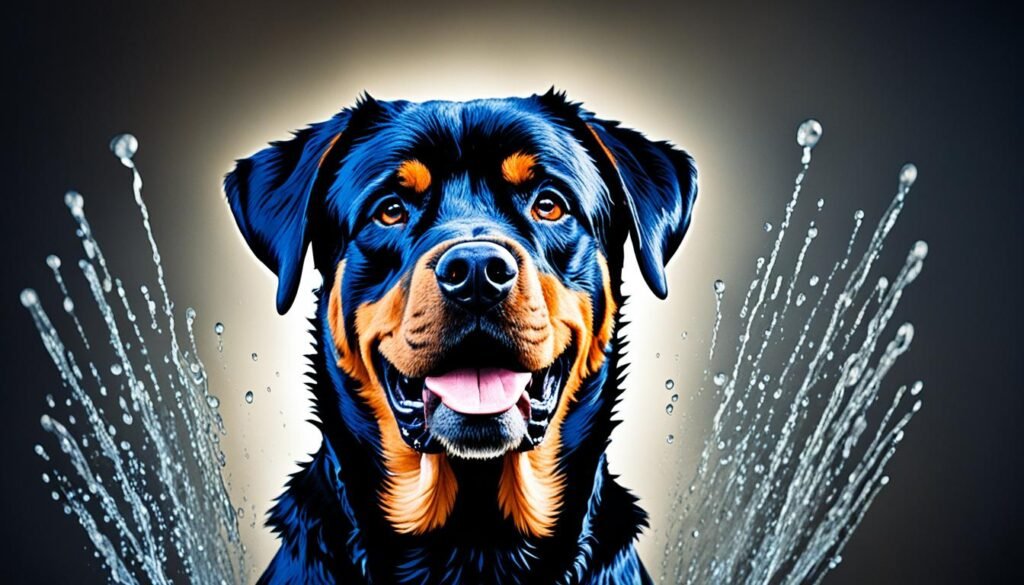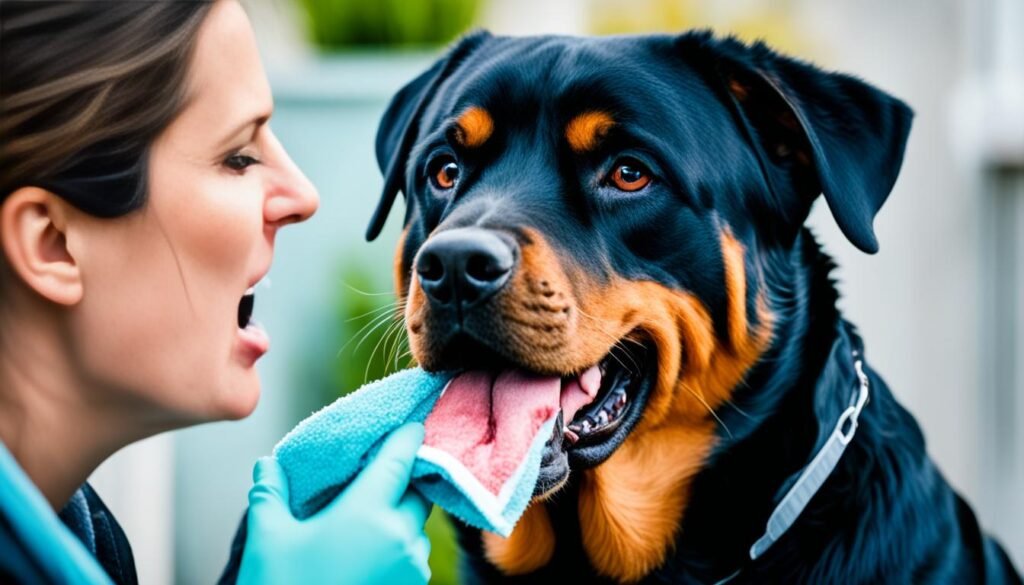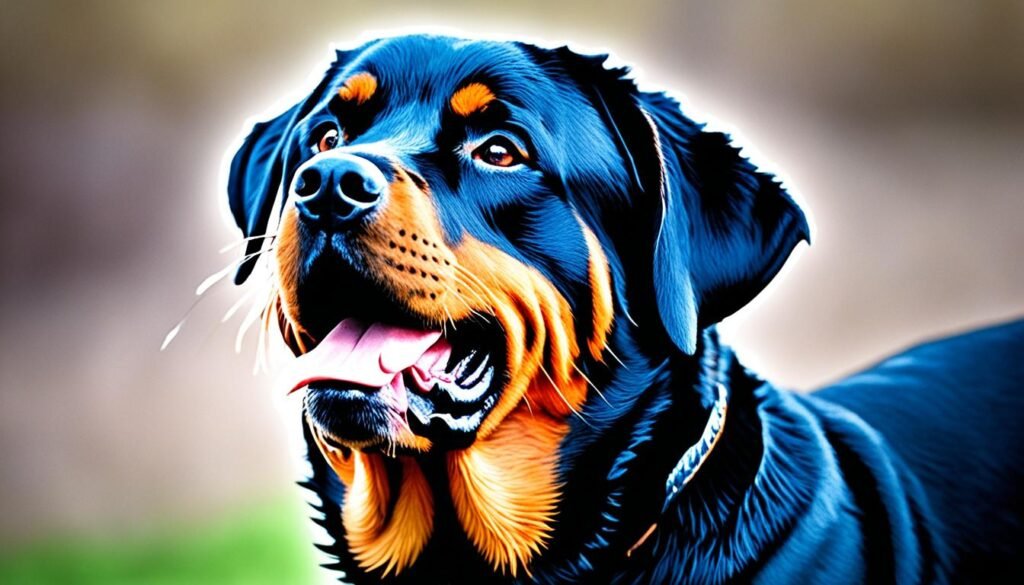Did you know that Rottweilers are notorious for their drooling habits? If you’ve ever been around one of these gentle giants, you’ll understand the struggle of managing their excessive drool. Whether you own a Rottweiler or are considering getting one, it’s essential to understand why they drool and how to effectively manage it. So, let’s dive deeper into the world of Rottweiler drooling habits.
Key Takeaways:
- Excessive drooling is a common characteristic of Rottweilers due to their anatomy and natural saliva production.
- Drooling can be triggered by various factors, including food, sensory stimulation, stress, pain, and certain health conditions.
- Monitoring drooling patterns is crucial to identify any underlying health issues that may be causing excessive drooling.
- Managing and reducing drooling in Rottweilers can be achieved through proper dental care, addressing anxiety and stress triggers, and seeking treatment for underlying diseases.
- While it may not be possible to eliminate drooling entirely, implementing these strategies can significantly improve the comfort of both the dog and their owner.
Why Do Rottweilers Drool?
Rottweilers are notorious for their drooling habits, but have you ever wondered why they drool so much? Well, the answer lies in their saliva production. Rottweilers naturally produce saliva to aid in the digestion process. The size of their head, the length of their snout, and the presence of jowls all play a role in the amount of drool they produce.
Drooling in Rottweilers can be triggered by various factors. The smell or sight of food can make them salivate in anticipation of a meal. Sensory stimulation, such as petting or playing with their favorite toy, can also cause them to drool. Additionally, stress, pain, and certain health conditions can contribute to excessive drooling.
It’s important to distinguish between normal drooling and excessive drooling in Rottweilers. While drooling is a natural behavior, excessive drooling could indicate an underlying issue that requires attention. If you notice a sudden increase in drooling or if your Rottweiler’s drooling seems excessive, it’s essential to consult with a veterinarian to identify and address any potential health problems.
Understanding the factors influencing drooling in Rottweilers can help you better manage their drooling habits. By recognizing the triggers that cause excessive drooling and addressing any underlying health issues, you can provide a more comfortable and stress-free environment for your beloved Rottweiler.
Reasons for Excessive Drooling in Rottweilers

Excessive drooling in Rottweilers can be caused by various factors that pet owners should be aware of. Understanding these reasons can help you identify any potential health issues and provide the necessary care for your beloved pet.
- Eating or drinking: Rottweilers may drool excessively when they eat or drink, especially if they are particularly enthusiastic or have a tendency to gulp their food or water.
- Anxiety and stress: Just like humans, Rottweilers can experience anxiety and stress, which may cause them to drool excessively. This can be triggered by various factors such as separation anxiety, loud noises, unfamiliar surroundings, or changes in routine.
- Oral health issues: Poor dental hygiene, gum diseases, or oral infections can lead to excessive drooling in Rottweilers. It is important to regularly check your dog’s mouth for any signs of dental problems and seek veterinary care if necessary.
- Teething: Just like puppies of any breed, Rottweiler puppies go through a teething phase. During this time, they may experience discomfort and increased drooling as their adult teeth emerge.
- Nausea from stomach problems: Rottweilers may drool excessively if they are experiencing stomach issues such as indigestion, gastritis, or gastrointestinal problems. Nausea and discomfort can trigger excessive drooling in dogs.
- Hot weather and heatstroke: Rottweilers are prone to overheating, particularly in hot weather or if they are exposed to excessive heat without proper ventilation or hydration. Excessive drooling can be a sign of heatstroke and should be taken seriously.
- Pain: Dogs, including Rottweilers, may drool excessively if they are in pain or discomfort. This can be caused by injuries, musculoskeletal issues, or underlying health conditions.
- Underlying diseases: Certain diseases or medical conditions can cause excessive drooling in Rottweilers. These may include but are not limited to respiratory infections, liver disease, kidney problems, neurological disorders, and certain types of cancers.
- Toxins or poisons: Ingesting toxic substances or poisons can lead to excessive drooling in Rottweilers. It is important to keep hazardous materials out of your dog’s reach and be aware of potential dangers in your environment.
If you notice a sudden increase in drooling or if your Rottweiler exhibits other symptoms along with excessive drooling, it is crucial to consult a veterinarian for a proper diagnosis and guidance. Identifying the underlying cause of your Rottweiler’s excessive drooling is essential for their overall health and well-being.
Tips for Managing Rottweiler Drooling

While it may not be possible to completely eliminate drooling in Rottweilers, there are effective strategies for managing and reducing it. By implementing these tips, you can keep your Rottweiler comfortable and minimize the impact of drooling in your daily life.
- Seek treatment for underlying health issues: If your Rottweiler’s drooling seems excessive or out of the ordinary, it’s essential to consult with a veterinarian. They can examine your dog and address any underlying health conditions that may be contributing to the drooling.
- Inspect the mouth for dental or oral health problems: Dental issues such as gum disease or tooth decay can lead to increased saliva production and drooling. Regularly examine your Rottweiler’s mouth for any signs of oral health concerns and address them promptly.
- Provide proper dental care: Maintaining good oral hygiene for your Rottweiler can help reduce excessive drooling. Brush their teeth regularly with dog-friendly toothpaste and offer dental treats or toys designed to promote dental health.
- Address anxiety and stress triggers: Rottweilers may drool more when they are anxious or stressed. Identify and address the triggers that cause stress for your dog, whether it’s new environments, thunderstorms, or separation anxiety. Providing a calm and secure environment can help reduce drooling.
- Offer frozen chew toys for teething: Puppies and young Rottweilers may drool more during the teething phase. Providing them with frozen chew toys can help soothe their gums and reduce the amount of drooling.
- Ensure a healthy diet and address stomach issues: Proper nutrition plays a role in managing drooling in Rottweilers. Feed your dog a balanced diet that supports their overall health. If your Rottweiler experiences stomach issues, such as acid reflux or gastrointestinal problems, consult with a veterinarian to address these issues and minimize excessive drooling.
- Provide adequate shade and water in hot weather: Rottweilers may drool more in hot weather or when experiencing heatstroke. Ensure your dog has access to shade and fresh water to keep them cool and prevent dehydration.
- Seek professional advice and treatment for pain or underlying diseases: Sometimes excessive drooling in Rottweilers can be a sign of underlying pain or diseases. If you notice sudden changes in drooling patterns or other concerning symptoms, consult a veterinarian for a thorough examination and appropriate treatment.
Conclusion
In conclusion, it is important for Rottweiler owners to understand that drooling is a natural behavior for these dogs. While some drooling is to be expected, excessive drooling may indicate an underlying health issue or be triggered by anxiety or excitement. By being proactive and implementing proper management techniques, owners can minimize the impact of drooling in their Rottweilers’ daily lives.
One key aspect of managing drooling in Rottweilers is addressing any underlying health issues. Regular visits to the veterinarian can help identify and treat any medical conditions that may be causing excessive drooling. Additionally, maintaining good dental hygiene and addressing any oral health problems is crucial in minimizing drooling.
Managing anxiety and stress is another important factor in reducing drooling. Providing a calm and comfortable environment for Rottweilers, engaging them in regular exercise and mental stimulation, and using relaxation techniques can help alleviate anxiety and reduce excessive drooling.
Lastly, implementing other management techniques such as frozen chew toys for teething, ensuring a healthy diet and addressing stomach issues, providing shade and water in hot weather, and seeking professional advice for pain management or underlying diseases can greatly contribute to managing and minimizing drooling in Rottweilers. By taking these steps, owners can ensure the comfort of their Rottweilers and enhance their overall well-being.
FAQ
Do Rottweilers drool?
Yes, Rottweilers are known to drool. However, the amount of drooling can vary between individuals.
Why do Rottweilers drool?
Rottweilers drool because they produce saliva to aid in the digestion process. The size of their head, the length of their snout, and the presence of jowls can all contribute to the amount of drool they produce.
What are the reasons for excessive drooling in Rottweilers?
Excessive drooling in Rottweilers can be caused by various factors including eating or drinking, anxiety and stress, oral health issues, teething, nausea from stomach problems, hot weather and heatstroke, pain, underlying diseases, and toxins or poisons.
How can I manage Rottweiler drooling?
To manage Rottweiler drooling, you can seek treatment for any underlying health issues, inspect the mouth for dental or oral health problems, provide proper dental care, address anxiety and stress triggers, offer frozen chew toys for teething, ensure a healthy diet and address stomach issues, provide adequate shade and water in hot weather, and seek professional advice and treatment for pain or underlying diseases.
